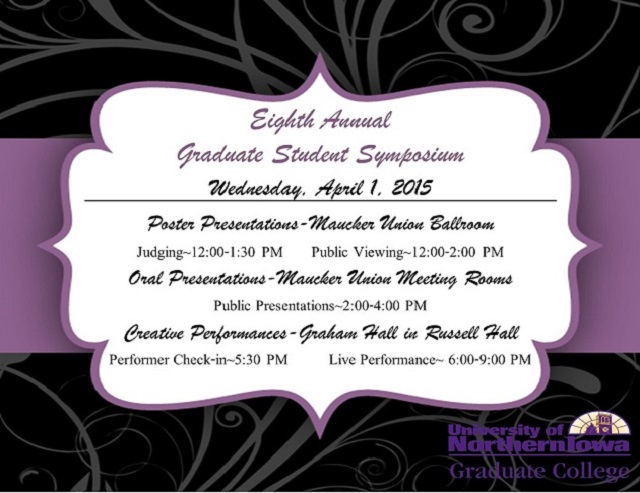
Complete Schedule
Award Winner

Recipient of the 8th Annual Graduate Student Symposium Award, Oral Presentations, Oak Room - First Place (2015)
To go to the Graduate Student Symposium event page, Click here
Presentation Type
Open Access Oral Presentation
Keywords
Behavior disorders in children; Learning disabled children--Identification;
Abstract
Children with Sluggish Cognitive Tempo (SCT) are characterized by a hypoactive, sluggish behavior pattern that does not fully fit the conceptualization of Attention-Deficit Hyperactivity Disorder (ADHD) as was previously believed. Interest in this topic has surged recently, perhaps due to the fact that many researchers now view SCT as a construct that exists outside of ADHD (Barkley, 2014). SCT is associated with unique etiology, impairment, and comorbidities. Unlike ADHD, SCT represents a more passive form of inattention that may not disrupt the classroom. Thus, SCT may go unnoticed despite the fact that it is related to many academic and social difficulties (Becker & Langberg, 2013), and that early identification and intervention are crucial for the child’s success. The current study examined pre-service teachers’ knowledge and perceptions of SCT compared to two more well-known childhood disorders. Specifically, 161 Elementary Education majors read vignettes describing three fictitious boys presenting with symptoms of SCT, a common externalizing disorder (ADHD), and a common internalizing disorder (Social Phobia; SP), and rated each of the three vignettes in terms of their concern for the boy described. Results indicate that participants viewed all three disorders as concerning, but viewed the ADHD and SCT behaviors as the most problematic. However, participants indicated they would be the most likely to refer the child with SP to a school psychologist. Participants also had the most favorable attitudes toward working with the child with SP. Results highlight the need to better educate pre-service teachers about mental health problems in the classroom.
Start Date
1-4-2015 2:00 PM
End Date
1-4-2015 4:00 PM
Year of Award
2015 Award
Faculty Advisor
Elizabeth Lefler
Department
Department of Psychology
Copyright
© 2015 Rachel Meisinger
File Format
application/pdf
Embargo Date
3-15-2015
Identification of Sluggish Cognitive Tempo by Teachers
Children with Sluggish Cognitive Tempo (SCT) are characterized by a hypoactive, sluggish behavior pattern that does not fully fit the conceptualization of Attention-Deficit Hyperactivity Disorder (ADHD) as was previously believed. Interest in this topic has surged recently, perhaps due to the fact that many researchers now view SCT as a construct that exists outside of ADHD (Barkley, 2014). SCT is associated with unique etiology, impairment, and comorbidities. Unlike ADHD, SCT represents a more passive form of inattention that may not disrupt the classroom. Thus, SCT may go unnoticed despite the fact that it is related to many academic and social difficulties (Becker & Langberg, 2013), and that early identification and intervention are crucial for the child’s success. The current study examined pre-service teachers’ knowledge and perceptions of SCT compared to two more well-known childhood disorders. Specifically, 161 Elementary Education majors read vignettes describing three fictitious boys presenting with symptoms of SCT, a common externalizing disorder (ADHD), and a common internalizing disorder (Social Phobia; SP), and rated each of the three vignettes in terms of their concern for the boy described. Results indicate that participants viewed all three disorders as concerning, but viewed the ADHD and SCT behaviors as the most problematic. However, participants indicated they would be the most likely to refer the child with SP to a school psychologist. Participants also had the most favorable attitudes toward working with the child with SP. Results highlight the need to better educate pre-service teachers about mental health problems in the classroom.


